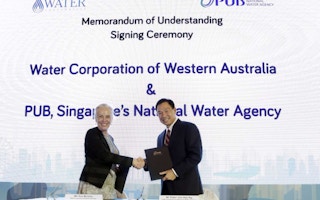In a bid to deepen collaboration on common water challenges, Singapore’s national water agency PUB has signed memorandums of understanding (MOUs) with utilities in Saudi Arabia and Australia to boost knowledge sharing and build capacity in water reuse and recycling, research and development (R&D) and innovation.
To continue reading, subscribe to Eco‑Business.
There's something for everyone. We offer a range of subscription plans.
- Access our stories and receive our Insights Weekly newsletter with the free EB Member plan.
- Unlock unlimited access to our content and archive with EB Circle.
- Publish your content with EB Premium.
PUB signed the MOUs with Saudi Arabia’s Saline Water Conversion Corporation (SWCC) and Western Australia’s Water Corporation on the sidelines of a Singapore International Water Week (SIWW) event at the Shangri-La’s Rasa Sentosa Hotel on Tuesday.
The MOU with SWCC includes exchanging knowledge on desalination, as well as other resource conservation technologies such as energy reduction, water management systems, leak detection and automated metering.
The MOU with Western Australia’s Water Corporation includes cooperation and collaboration on technologies that will secure urban water supply amid climate change threats, including wastewater treatment, smart water technologies, as well as strategies to engage customers on these issues.
“
Climate change, pollution, population growth and urbanisation, and rising cost of operations compel water utility leaders to work ever closer together to co-create mutually beneficial solutions.
Ng Joo Hee, chief executive, PUB
The MOU signings were part of a two-day spotlight event organised by SIWW, which is a company established by PUB and the Ministry for the Environment and Water Resources. The conference, themed ‘Forging Alliances Amongst Global Water Utility Leaders’, brought together governments, utilities, industry, and research institutions to discuss pertinent water issues.
Both MOUs will also provide opportunities for staff exchanges, where employees can share their experience about the utility issues they face, and work to resolve common water challenges.
PUB chief Ng Joo Hee said that water utilities around the world encounter many common issues in their work to supply safe and adequate water to their customers, and therefore need to collaborate with one another to solve these challenges.
“Climate change, pollution, population growth and urbanisation, and rising cost of operations compel water utility leaders to work ever closer together to co-create mutually beneficial solutions,” he said.
Singapore also announced that it is the new location for Japan’s Kurita Water Industries, Ltd., which has chosen the city-state as its new Southeast Asia water research and development (R&D) base.
The newly formed Kurita R&D Asia, backed by PUB and the Singapore Economic Development Board (EDB), will be the company’s first R&D centre in Asia outside Japan when it opens in January 2018, and will focus on water reuse and recycling technologies, primarily to supply water to Singapore’s manufacturing sector.
Kurita executive officer Tatsushi Kuramae said Singapore was a natural choice to be the company’s regional base due to the concentration of universities, research institutes and corporate research and development facilities in the city-state.
“This forms a strong support system for Kurita to tap on, to expedite our development and strengthen our technological capabilities,” he said.
“
Singapore is in many ways a bellwether to the rest of the world with regards to water. Dealing with water issues, therefore, is hardwired into our DNA.
Masagos Zulkifli, minister for environment and water resources, Singapore
The new R&D centre, which is located at Clean Tech Park in the western part of Singapore, adds to over 20 water innovation companies already located in the city-state, now a world-recognised hub for leading-edge water technologies.
Singapore’s Minister for the Environment and Water Resources, Masagos Zulkifli, who opened the conference, said in his address that in an increasingly thirsty world, it is important for nations to unite and and work together on universal challenges to ensure an adequate and reliable supply of water.
“Singapore is in many ways a bellwether to the rest of the world with regards to water. Dealing with water issues, therefore, is hardwired into our DNA,” Masagos said.
Ensuring a constant supply of clean water for Singaporeans requires non-stop work and employing one of the most comprehensive source-to-tap water quality monitoring programmes in the world.
For instance, Singapore’s water supply is made up of four National Taps—rainwater collected in catchment areas, desalinated seawater, imported water, and reclaimed wastewater, known as NEWater. These various sources pass through some 400,000 tests annually over 300 different water quality parameters, Masagos said.
The result is clean, safe, high quality water that far exceeds international standards including that of the World Health Organization (WHO).
He said that Singaporeans tend to take clean water for granted, but this should not be the case. Masagos said efforts to maintain water quality require heavy investments on infrastructure and proper maintenance, and this requires financial sustainability. This is one of the reasons the water price has increased this month for the first time in 17 years to reflect the true cost of water, he said.
“If we do not continually shore up our water system, to keep its foundations strong, it will surely come under strain. All these are done so as to ensure that Singaporeans continue to enjoy a high quality and reliable water supply,” Masagos said.










